The coldest day on record in southern Illinois was February 2, 1951. A dome of bitter Arctic air settled over the entire state all that week, seeping and whispering through the drafty window casements of my parents’ sagging farmhouse, driving my parents, with my two-month-old brother, Marshall, to huddle next to an inefficient coal-burning stove, and giving rise to me exactly nine months later.
My parents endured much gentle ribbing after my unplanned birth, knowing glances and friendly snickering about Irish twins from neighbors down at Leonard Wilson’s General Store, along with a few hard pats on my father’s back at church that turned his face beet red. No weather excuses or other explanations were given when my sister’s birth occurred hardly two years after I entered the world, but I can imagine the new rounds of stares and bemused smiles directed at my parents. Our mother, her façade of confidence no doubt betrayed by a rosy blush suffered the most from the community’s gentle but unrelenting judgment, facing all this subtle embarrassment along with the daunting situation of having three kids basically in diapers.
My mom’s third pregnancy and the birth of my sister brought the first remembered disturbance in my life. My mother suddenly had much less energy, and I was barely a toddler, an age when a child needs a great amount of tender attention and engagement. When our mother went to the hospital to give birth to our sister, Grandma Newell came to take care of Marshall and me. She was sixty-five and frail, two inches shy of five feet, so waif-like in appearance she seemed a little girl. We got into the pantry that evening and tore off every can label, playfully tossing the cans her way when she tried to intercede with a whispery voice. The next day Marshall got to go to Grandma Mills’s, who lived nearby, and I was banished to stay with my half sister’s grandmother and aunt who lived in Mt. Vernon, two eccentric women I hardly knew and whose heavily rouged faces and exaggerated eyebrows made me scared. Once there, I struggled not to have a bowel movement, afraid of how these strange women might respond. I was unsuccessful but kept the event to myself, walking as little as possible, moving stiff-legged when I did until a sour pungent aroma gave me away.
After my mother and baby sister Karen came home, many nights were filled with a newborn’s inconsolable wailing. After Karen was fed and changed and the night grew quiet again, I frequently stole into my parents’ bedroom and with tiny hands shook my weary mother awake, asking her to rock me and pat my back, which she graciously did, often falling asleep in mid-rock while I soaked up her presence.
Of my mother’s family’s history, I knew very little, just that her ancestor Asa Blake Newell, a farmer of flinty New England soil, escaped Vermont in 1816 during the brutal “year of the two winters,” stopping off in Marietta, Ohio, long enough to marry. From there, the Newell family traveled to southern Illinois, where they settled.
There was one other tidbit from our mother. Once, in quick passing, she told us she had received a full scholarship to Southern Illinois University after high school, thinking she wanted to become a doctor or teacher, but dropped out before the second semester. She never shared any more information about the story, so it lingered there, the tip of another iceberg.
After my parents married, my mother, like Ruth in the Bible, left her parents in the town of Waltonville, coming to live among my father’s extended family and giving up any dreams of a professional vocation to live in a three-room southern Illinois farmhouse and raise children. While Mother’s situation may have possessed something of a romantic element, there was also a crude, uncomfortable surrender that came with her choice, a reality that always leaped out every time she told the story of her first visit among my father’s people.
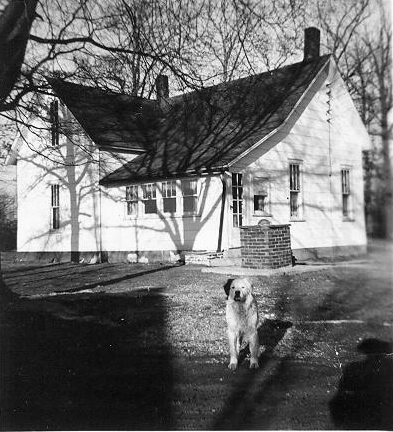
Dad had wisely brought my prim and proper Methodist raised mother to the little country Baptist church his family attended for her visit there in July of 1948. Here, she saw her prospective husband leading a small group of off key singing church choir members—the women in their very best dresses, a few in hats, the men in freshly laundered overalls with white shirts and ties. It was during a break in the service, however, that she received her first hint of what her life would be like among these people. The women’s toilet was an outhouse with two seats, placed discretely in back of the church next to a clump of sapling trees.
Mom opened the door and took a step in, only to look up and see an older woman in the dimly lighted space, occupying one of the holes. Mom began to back out, apologizing profusely as she did, but the woman convinced her otherwise. “Please, sit down with me Mary Alice. We can talk. Keith is a lucky man to have found you.”
In what must have been a sudden epiphany, our town bred mother pulled the door shut behind her and prepared to do her business, chatting all-the-while with her new friend, not quite believing what she was doing.
The remote part of northeast Jefferson County where we lived, a region commonly called Horse Creek, was made more isolated by poor roads, the nearest state highway, Illinois 15, unfolding east–west across the state several miles to the south of our weary-looking little farmhouse. Our mother, used to a life in Waltonville of some sophisticated diversions before her marriage, found herself marooned in this lonely countryside, surrounded by clannish neighbors who were perfect strangers to her, confined with two rambunctious little sons she could hardly contain and a needy baby daughter. In this place our mother had to negotiate with many new and sometimes subtle forces. Dad’s parents, Kermit and Ruby, lived nearby and my grandma Mills was like a sun that held our earth father in a shrewd orbit. Our father’s shifting moods was yet another piece of a difficult puzzle our young mother had to solve.
When not overwhelmed, our mother playfully called my brother and me her little “Jacob and Esau.” But those times were rare. Our father arrived home from work one day and found her sobbing. Marshall and I had happily played most of the day with a large mixing bowl, a wedding present to our mother. We spun the white bowl around on the kitchen table, laughing until the bowl spun unexpectedly off the side, crashing down on the scarred linoleum floor and exploding into pieces. A deformed noise, more a lament than a scream, rose up from deep inside our mother. She was still crying, hunched over in a kitchen chair, holding our baby sister, Karen, when Dad came home. “Keith, they’ve broken the last thing I had,” she said, and began weeping again in great gulps.
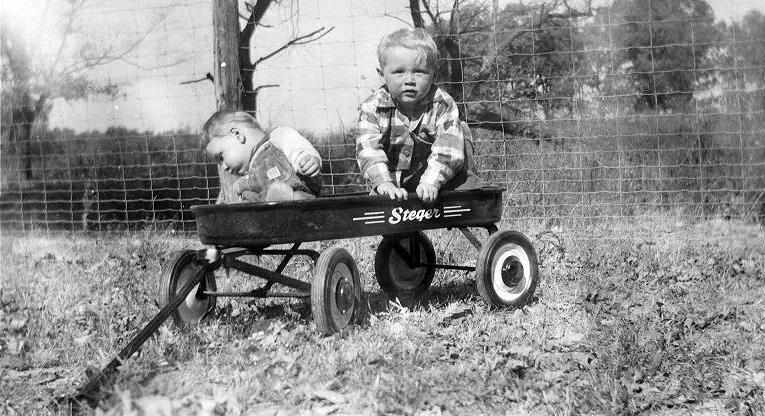
Two events occurred quickly after our mother explained why she was crying. First, she witnessed the brutal consequences of her complaining about our behavior, hearing our cries as our father whipped us in our bedroom with his belt. The second consequence arrived the next morning when Grandpa Mills, farm cap pushed back on his head and sleeves rolled up, began building a sturdy woven wire fence around our yard. It was this latter event that gave rise to a story that I often made my mother repeat, a story she wove over the years into a lesson of understanding and love.
With the new fence, our mother received a desperately needed reprieve from our little-boy rowdiness, and we were able to burn off energy while not tearing up the house. But a fenced-in yard was a mixed blessing for Marshall and me, teasing us with fascinating things that existed just outside our reach: parading groups of fuzzy little chicks begging to be picked up and squeezed; trees with low-hanging branches for climbing; six bony, brown-hide Jersey cows with watery eyes so big and intelligent looking, they seemed almost human.
Those cows, the providers of milk and cream that we traded down at Wilson’s store for groceries, held our greatest interest that summer. When we stood still and gazed at them from the confines of our yard, they always seemed to be huddling together, staring back at us. I had been aware of their presence before I ever saw them, waking each morning to their chorus of sorrowful moos. When Marshall and I asked our parents about them, Mother laughed and told us their tongues were blue and rough, “like rasps.” Our father, hearing her comment, warned us that the cows were large animals, easily spooked, and that one of their misguided hooves could effortlessly crush a skull or break an arm or a leg.
Every day that our mother placed us in the yard, we initially scoffed at the fence before turning to find some entertainment in the sturdy enclosure our Grandpa Mills had built. One morning Marshall and I had an anthill half kicked in, exploring the ensuing chaos with probing sticks, when soft bass-note moos, like a warm beckoning, drifted in the air. At that moment, Marshall settled forever the question of the fence’s power to contain us, pushing me like a half-filled sack up and over the shiny woven wire fence, then scrambling up and over after me. In a creased and yellowed photo I possess of my brother and me taken around the time of this adventure, a beguiling shock of hair hangs down over his broad forehead. He favored our father in looks and was destined to get away with many things.
We stood stock-still on the other side of the fence, prepared to hear our mother shouting at the top of her lungs, “Marsh-ALL, Ran-DEE, you two get back here!” Hearing nothing, we broke free from the fence, I, padding along in the gait of a chubby toddler, turning once to gaze back at the safety of our fenced-in yard, my brother plunging on toward the cows like an impatient explorer.
An exotic caravan, the six cows came ambling lazily to the edge of their side of the fence, pink, swollen bags gently swaying underneath each of them. They wore proprietary expressions, as if they knew they owned this place. A single strand of wire, an electric fence a little higher than knee height to a grown man, separated us from these astounding beasts.
Everything about these creatures seemed magical. Their eyes were alive and alert, shining like large, watery gems. Their long blue tongues were just as our mother described them, wrapping around thick bunches of grass, wrenching it free from the grip of the earth with sharp ripping sounds, ragged tails whisking at the air. I would not have been surprised if these otherworldly creatures had suddenly called out our names and I could have gladly stood there forever under their spell if Marshall had not reached over the wire to touch one of them.
The animals bolted away in a burst of motion, zigzagging back into the deeper part of the field, shadowy figures at the edge of our woods.
We had little time to recover from the wondrous experience of being so close to the cows. Beyond the pasture an even greater unknown, a vast unmapped sea of fields and woods, beckoned. Only one obstacle remained to our entering that world—the electric fence. Marshall again took the initiative. He safely pushed my head down and then pushed my body under the fence.
As would happen many times in the future, there was a price to be paid for my brother’s helpfulness. I crawled through a pungent heap of fresh cow manure. The sight of the gooey muck that covered me completely on one side and matted down most of my hair made Marshall pinch his nose. In other circumstances he probably would have abandoned me, but the scene before us, the distant woods of giant oak trees looming in the sultry haze, demanded company, mystery best shared with another.
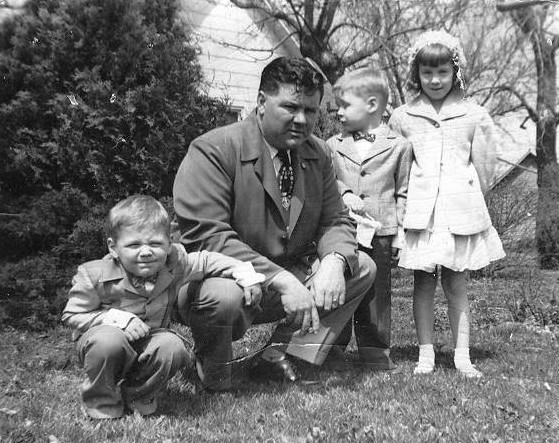
Our mother had just put baby Karen down for a nap when she chanced to look out the kitchen window, her heart going to her throat when she saw our heads bobbing in the tall grass at the far edge of the field. Seconds later, at full stride, she exploded through the yard’s gate, forgetting the sleeping babe that had just been the complete center of her attention. She shouted, then screamed, but we paid no heed to her cries.
She managed to catch up to us just as we arrived at the very edge of the field, preparing to plunge into the thick tangle of poison ivy and thorny brush of the woods.
Mother’s plan for our punishment, she later told me, formed as she scampered in a panic after us. “I was so upset that you little guys might get lost or hurt. And then there was the problem of how your dad might react. But I knew you both had to be taught a painful lesson.” She explained how she was going to jerk us home, popping us on our butts a few times on the way, and, when we got back to the house, spank us so hard we would never run off again.
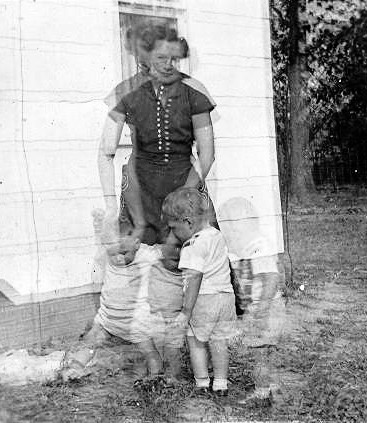
In reality, she did none of this.
Struggling to catch her breath, our pale, shaking mother held each of our hands as she led us back home. Her panicked running had brought her to near collapse. But we were safe—elated, even, by our adventures—two sweet little tow-headed boys, Irish twins, laughing and basking in the attention of our mother.
When we got back to the house and through the gate, Mother gently fingered through our hair, picking off the ticks that had attached themselves to us as we had walked through the tall grass. She wrestled out a fifteen-gallon galvanized washtub from the smokehouse and filled it with water from a hose. We were given quick cold baths, scrubbed with a fat bar of pumice soap—Marshall first, since I was still covered in cow manure goo. Of all the things I remember from that day, the warm glow that came to my skin from the coarseness of the towel she used to rub us dry—the rough chafing of love and understanding—has stayed with me the most deeply.
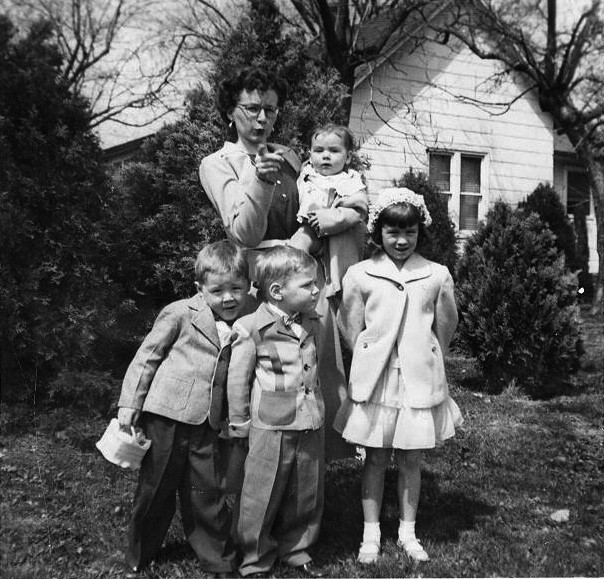
Many things have happened since the day my brother and I climbed the fence to go see those cows. My older brother ended up with the family farm, whereas I moved out of state and sought a life in academia. Karen, our sister, became a kindergarten teacher and recently retired from teaching at the little country school my siblings and I had all attended. My father got out of the milk and cream business in the mid-1950s, soon after taking a car salesman job in Mount Vernon, Illinois, and our six wonderful Jersey cows were sold to a neighbor. Our mother, a straight-A student in high school and for one semester in college, a person probably cut out to be a schoolteacher or nurse, threw herself into the difficult life of being a diligent housewife and mother in a remote rural setting.
Over the years I have sometimes felt great guilt about my mother’s situation, knowing the professional life she might have lived had she not had to deal with us kids. I would like to believe, though, that our six Jersey cows who witnessed the drama of my brother and I scaling the fence that day and our mother’s frantic pursuit offered her some level of sympathy, watching with their large, kind, luminous eyes as Mother wearily brought us back to the house, the cows understanding and appreciating the difficult journey that lay before her.